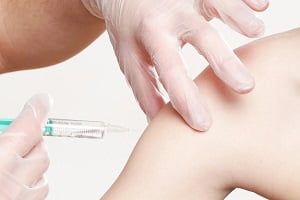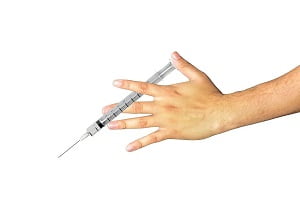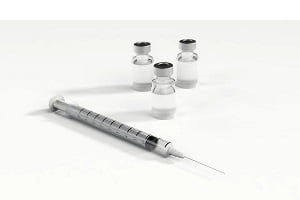Is Tetanus Vaccination Required After Every Wound?
- Updated on: Nov 16, 2023
- 3 min Read
- Published on Nov 9, 2020

Tetanus or lockjaw is a severe medical condition known as trismus, caused by the bacterium Clostridium tetani. The chewing muscles get contracted and inflamed due to tetanus infection, causing trouble while opening the mouth opening. The tetanus bacteria can enter into the body via wounds caused by contaminated objects. Inside the body, they produce some harmful toxins, which result in painful muscle contractions.
How Often do we Need Tetanus Boosters?
It is a common practice among people to get vaccinated after they get injured by an iron object, especially the one that is rusted. However, getting a tetanus vaccine after injury by an iron object is not mandatory in people who have received primary vaccination during childhood. As an adult, if you have taken a Tdap vaccine, then you are safe from tetanus infection for almost ten years.
You don’t need a tetanus vaccine for your children who are vaccinated with DPT or Pentavalent vaccine and have received booster at one and a half years and five years. Tetanus is a severe and deadly disease, but its incidence has gradually declined due to proper primary vaccination. Our emphasis should be on 100 % coverage of primary immunization for every child. Tetanus vaccine is not required after every wound if the person has been administered with primary immunization.
Read About Tetanus Adverse Reactions Following Tetanus Vaccination in Some People
Tetanus Boosters in Children
Parents usually get their children vaccinated after every wound, which is not necessary. It is very important to remember when the child was vaccinated last time. When a child is born, he/she gets immunized with a dose of Bacillus Calmette – Guérin (BCG) vaccine, which provides immunity against tuberculosis. Hepatitis B vaccine and a dose of DPT vaccine boosters are given at the age of two months, four months, six months, 14-18 months, and 4-6 years. Then, for the next 15 years, until the child turns 20, the child does not need to be vaccinated for every wound, even from a rusted nail. Tdap booster should be administered after every ten years.
If a five years old child gets injured and he/she has not undergone primary vaccination, in that case, he/she should be first given three shots of DPT immediately and after the injury, and the next two shots are given after an interval of four to five weeks, and then no tetanus vaccine is required for the next five years.
Tetanus Boosters in Adults
Adults with no record of primary vaccination for tetanus should get vaccinated with tetanus vaccine (Tdap) within 24 hours of injury, followed by two boosters of DT shots with an interval of two months.
Tetanus Boosters in Pregnant Woman
Pregnant women are often being boosted with tetanus toxoid to protect the child from neonatal tetanus. If the pregnant woman has received the Td vaccine in the preceding ten years or more, Td should be given in the second or third trimester and a quick Tdap postpartum shot. Women who have never received any tetanus shot are given two shots of Tdap during pregnancy with a gap of four weeks in between. The third booster is given after 6 – 12 months of the second shot.
What Will Happen if We Take Tetanus Vaccine After Every Injury?
Tetanus boosters are not meant to be injected after every wound. But, people, due to lack of knowledge, get vaccinated after every injury. Tetanus vaccine, once taken, has its effect for at least ten years. Too much of the vaccine will cause severe side effects and local reactions.
Some of the side effects are listed below:
Nausea, Diarrhea, and Vomiting: These are caused after receiving the Tdap vaccine. In such cases, fluid intake, avoiding spices is recommended. Antiemetic and oral rehydration solution (ORS) can be taken to treat such side effects.
Redness and Swelling at the Injection Site: Pain, swelling, and redness at the injection site are widespread after a tetanus shot. These side effects usually go away in a few days. Any analgesic and antihistamine drugs can be taken to get relief.
Tiredness: It is ubiquitous to feel drowsy after the tetanus shot. It is a sign that the body is working to build immunity against the disease.
Headache and Body Ache: This side effect subsides in a few days. Analgesics like ibuprofen and acetaminophen can be used to treat this.
Fever: Mild fever upto 38?C can be experienced after a tetanus shot. This can be treateand by taking over the counter (OTC) drugs like ibuprofen and acetaminophen.
FAQs
Who Should Get These Vaccines?
An adult who wants to be protected from diseases like diphtheria, tetanus, and whooping cough can get vaccinated. Also, children can get vaccinated after two months. Regular boosters are needed throughout life.
After How Many Years Tetanus Boosters are Recommended?
Tetanus boosters are given after a regular interval of 10 years.
What are the Side Effects of the Vaccine?
There are various side effects of toxoid boosters like fever, headache, nausea, edema, hypotension, and nerve damage.
How Prevalent is Tetanus in the United States?
On average, 30 cases are reported every year.












